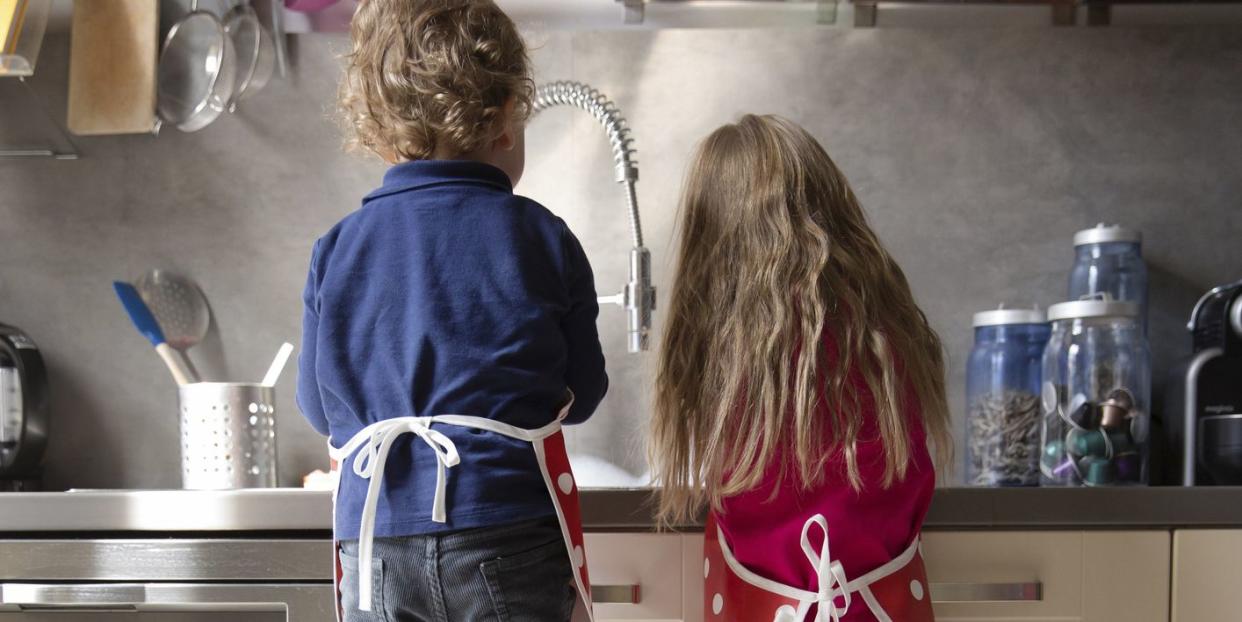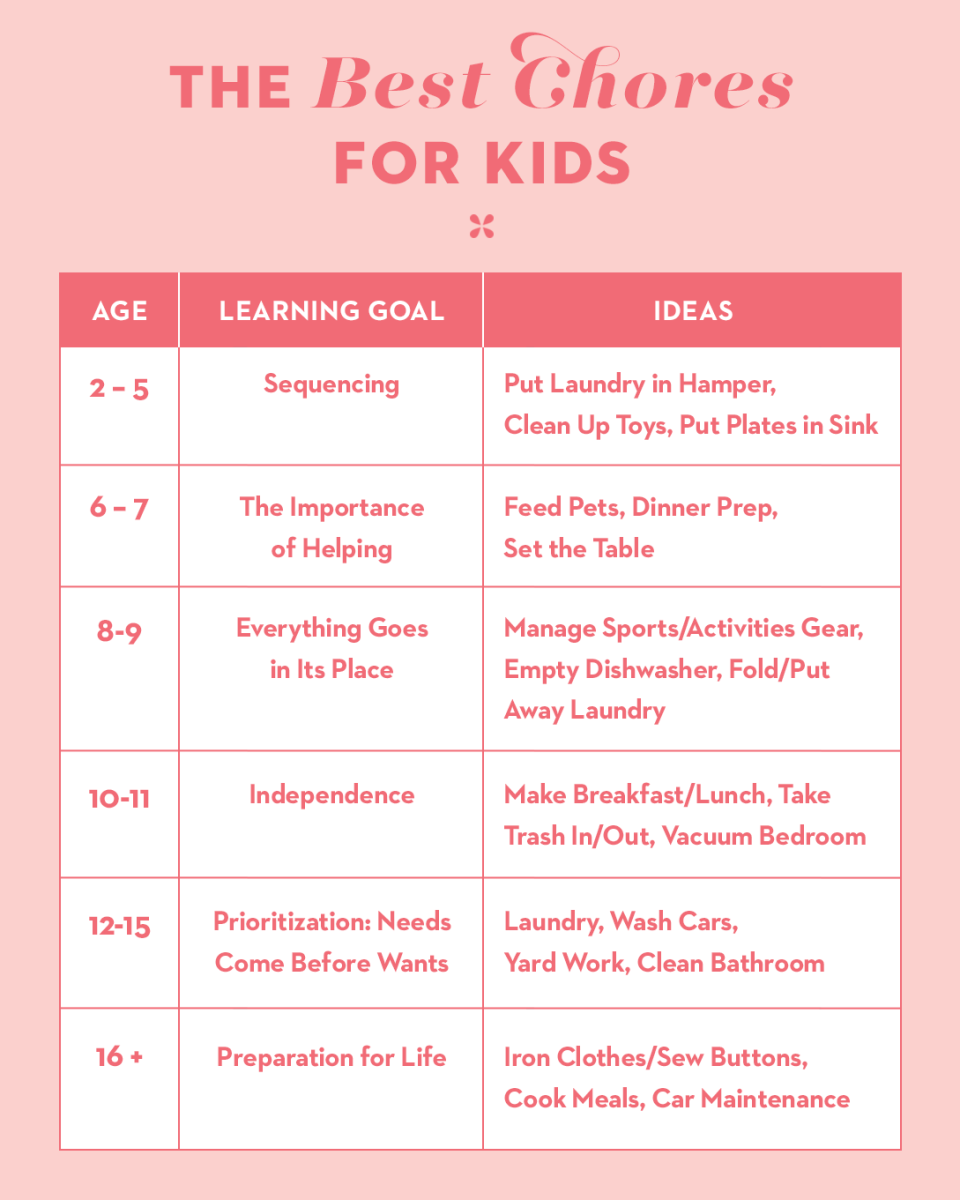Don't Give Kids "Chores." Teach Them That Helping out Is Part of Being a Family.

There are so many benefits to giving kids chores: They learn responsibility, pick up new skills (like how to load a dishwasher properly), and — bonus! — take some housework off their parents' plates. The hard part is figuring out how to get children to just buckle down and do them.
Damon Korb, M.D., a fellow of the American Academy of Pediatrics and author of Raising an Organized Child, says you should focus less on the tasks themselves and more on what they can teach our children. In fact, he says you shouldn't even call them chores. "It sounds so onerous," he says. "Helping out around the house doesn't need to be a chore. I like to take the matter-of-fact approach: 'Everybody at our house helps each other – that's just what we do.'”
Chores also help kids practice the skills Dr. Korb says are essential to becoming organized and independent, like being consistent; figuring out the steps required to complete a task; giving everything a place; planning ahead; and problem-solving on the fly. "Another concept we attempt to teach our children is that there are things we need to do in life and things we want to do," he says. "In addition, younger kids need to learn how to break projects down into smaller steps. Chores are an important way to share these lessons."
Of course, you want to practice different skills at different ages, and chores that a toddler can handle are very different from tasks that can be done by a teen or tween.

For toddlers, the emphasis should be on teaching sequences and order. "When kids are little, it would be easier to do the chores yourself, but the purpose of chores is to help children to acquire new skills," Dr. Korb says. "Toddlers and preschoolers can learn that every task has a beginning, middle, and end: We take out a toy, play with a toy, and put a toy away." Clearing a plate after dinner, putting laundry in the hamper, and cleaning up their play areas are good chores for flexing these new muscles. Also, kids this age often love cleaning, so take advantage and let them help you out as best they can and do something like sort the silverware when you empty the dishwasher.
When kids reach 6 and 7 years old, that's when you can start instilling the importance of helping out; feeding the family pet is a good way to concretely demonstrate this type of responsibility. They can also lend a hand loading and unloading the dishwasher, folding and putting away laundry, and setting the table. And then when they get to be 8 or 9 years old, they can be even more responsible for themselves, too. "Children at this age are beginning to participate in community activities, so it's a great time for kids to learn how to manage their stuff," Dr. Korb says. "Help them to manage their soccer gear or dance bag. Teach them to keep their school materials and backpack in order." Work with them to establish a system where everything has its own designated space. Bonus: The more you keep on top of them to do this, the less you have to answer those pesky, "Where is my ..." questions.
"There is order inherent in meal preparation, so teaching children to cook at this age is also important," Dr. Korb adds. "Many 8-year-olds are capable of making their own breakfasts and packing their lunches for school." It's a good idea to keep what kids need for quick grab-and-go snack and meals within easy reach and see if they can make food prep a habit.
By the time they turn 10 or 11, they're ready for bigger tasks — and for the even bigger job of keeping track of everything they need to do themselves. "One way to help children with their independence is to use a chore chart," he says. "It serves as both a reminder and a timeline for different tasks. Children this age begin to despise their parents’ 'nagging,' so using a chart, if effectively done, can reduce the parents' need to remind kids about chores — or at least limit the badgering to 'go and look at your chart.'”
With a chore chart in place, 11- and 12-year-olds can start getting firmer deadlines for their tasks. "Help your child to understand how certain chores are time-sensitive, like unloading the dishes before dinner so that the dishwasher is ready to be used again afterward, or taking out the trash on Tuesday evening before a Wednesday-morning pickup." This will help them with their own time-management as they inch closer to high school. Household tasks they can take on at this point include vacuuming, mowing the lawn, doing laundry, getting the mail, taking the trash bins in and out, and yard work like raking or weeding.
And then we get to the teenage years, which have the possibility of going off the rails completely. But it's not that teens don't want to lend a hand. "Teens can be very helpful when they're motivated," Dr. Korb says. "The problem is that their motivations are often very different than ours. This is a good age to teach your children about prioritization: the need-to-dos should happen before the want-to-dos." So, homework comes before screen time, not after.
And then, as they get older, you'll want to make sure their chore list incorporates everything they'll need when they eventually go off and live on their own, like cooking meals, doing laundry, ironing, sewing buttons, taking care of a car, and cleaning. "How much we ask of teens can vary depending on their other involvements," he says. "A student who takes AP classes, does speech and debate, and participates in sports can be busy doing useful activities. Likewise a student with an after-school job is bettering themselves in a different way."
Of course, no parent will get their kids to sail through all their chores throughout life without any pushback. But when there's sand in the gears, it's important to stay cool. "It's easy for parents to become frustrated when their children don't do chores, because we can really use their help," Dr. Korb says. "Developmentally, children and teens are ego-centric. They don't understand their parents' perspective. Instead of getting angry, think of a new way to teach the lesson." For example, you might need to break down the chore into steps for a preschool or school-age child. If you're having a problem with a teen or tween, you can meet and talk about what's working and not working — and then let the teen get in on the problem-solving process. Not only will you get a buy-in from your teen, you'll give them the tools to work out more issues in the future.
You Might Also Like


